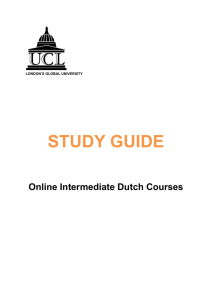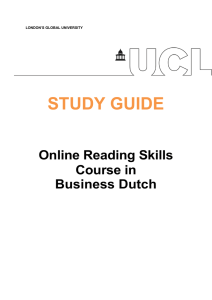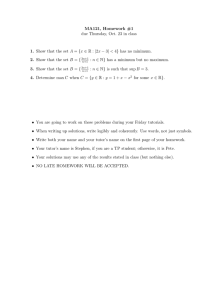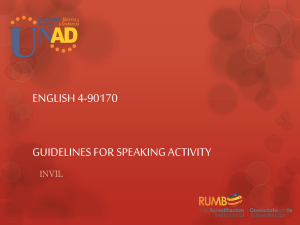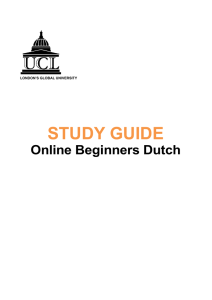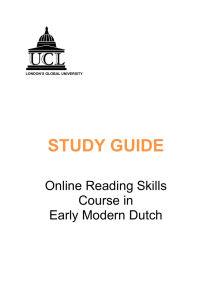STUDY GUIDE Online Advanced Dutch Course
advertisement
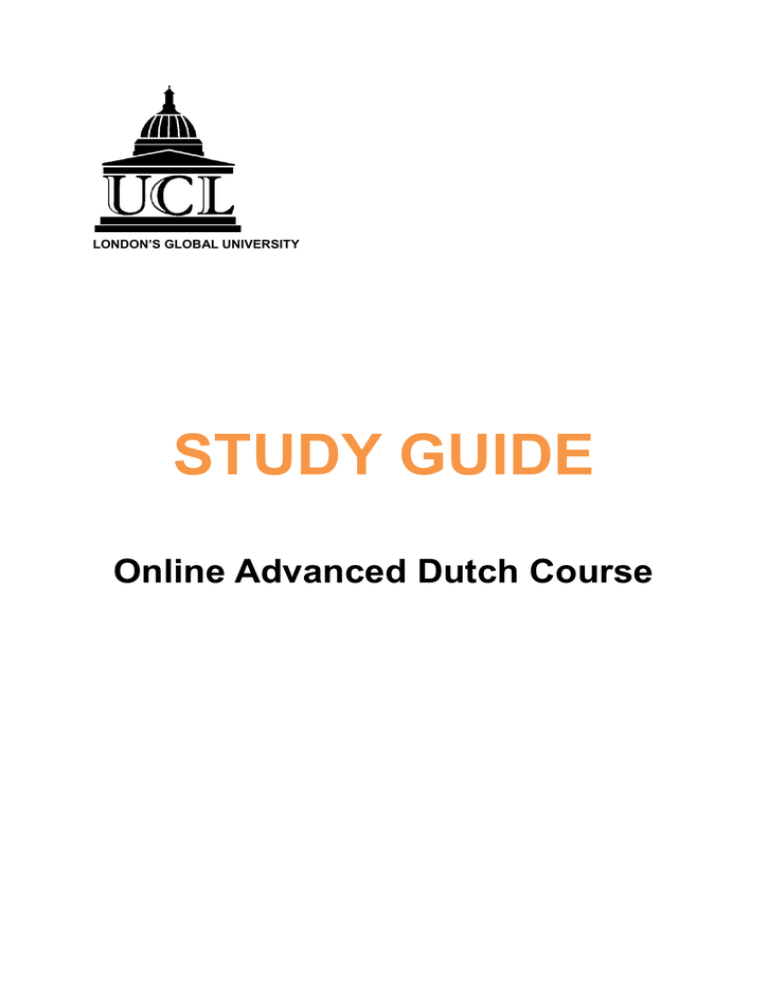
LONDON’S GLOBAL UNIVERSITY STUDY GUIDE Online Advanced Dutch Course CONTENTS 1. Introduction Curriculum 2. Syllabus 3. Delivery Procedures 4. Computer Specifications 5. Enrolment at UCL Support 6. Administrator 7. Academic Support Guidelines 8. Time Management 9. Coursework Guidelines Resources 10. Electronic Resources 11. Communication and Consultation Assessment 12. Assessment Criteria Contact 13. Staff Contact Details 1. INTRODUCTION This Study Guide provides information about the online advanced Dutch language course. It covers the course’s content, the methods of teaching and assessment, guidelines and advice for organising your work, and other essential information. 2. SYLLABUS Description The course is a tutor-supported online course for advanced learners of Dutch. It runs over 12-study weeks and is aimed at students who have successfully completed UCL’s online intermediate Dutch courses or who have reached a minimum linguistic standard of level B1 as defined by the Council of Europe. Taught in Dutch, the course is built around 6 thematic lessons. Each lesson has a different theme, ranging from the multicultural society of the Netherlands to the Dutch Golden Age. All lessons include authentic reading and listening materials. The course includes online activities designed to develop the four language skills of speaking, listening, reading and writing. They also foster your ICT and communication skills. All writing, listening and speaking tasks are tutor-supported and you receive feedback on all the work you do as part of the course. Key features of the course are the frequent videoconferencing sessions between you and your tutor. They allow you to practice your listening and speaking skills and to interact directly with your course tutor. 3. DELIVERY The course is delivered entirely online by means of a web environment and webcam sessions (Skype). 4. COMPUTER SPECIFICATIONS Minimum Requirements The minimum requirements correspond to a typical computer purchased not more than a few years ago. If you need to buy a PC, you should get a machine with, at least, a 3.0GHz processor, 1GB RAM, a DVD-ROM or combi drive, 100+GB hard disk drive, 17" LCD screen and all the other common items. We recommend a Windows-based PC, but some students (successfully) use computers with other operating systems. You will also need a webcam, microphone and headset for the online tutorials. Web Browsers and Internet Access The course website has not been tested on all the web browsers that are available. It has been tested on the two most recent versions of Internet Explorer, Google Chrome and Mozilla Firefox. Make sure you have internet access through broadband, as some applications will be extremely slow to launch with a dial-up connection. All modules require the use of PC-based videoconferencing. 5. COURSE REGISTRATION In order to register for the course, you need to pay the course fee in the UCL Online Store. After you have paid the course fees, the tutor will contact you with more information about the course and will give you a user ID and password for access to the course. 6. ADMINISTRATOR The Course Coordinator is Robert Lawson (r.lawson@ucl.ac.uk), and enquiries relating to registration and fee payment ought to be directed to him. You should also contact Mr Lawson if you are unavailable for certain periods, or if you are ill. Similarly, if you change your postal or email address, you should always inform Mr Lawson. 7. ACADEMIC SUPPORT Course Tutor Your Course Tutor’s task is to provide advice and guidance and to monitor your academic progress and well-being. He/She is normally your first port of call if problems arise. Course coordinator Robert Lawson acts as Coordinator of the Dutch online courses. You can contact him about general aspects of the course or indeed to raise any issues you do not wish to discuss with your Course Tutor. 8. TIME MANAGEMENT Online learning offers advantages, like being able to choose when and where to study. However, it also present challenges, especially when it comes to organising your time and workload. You may have other professional and family commitments and this might be the reason for choosing a distance-learning programme in the first place. Apart from interacting with your tutor online, you need to set time aside for personal study and coursework. It may be useful to set aside regular blocks of time for course work and to give yourself tangible targets for each of them (for example, doing a particular grammar exercise, listening to a recording). Also schedule in time to read and answer messages. Design your own timetable, taking into account busier and quieter times in your life. Plan ahead, e.g. by checking the due dates for coursework, assignments and examinations. Assess the time you will need for each. You will find a timetable for the course with an overview of the relevant dates and deadlines. If for any reason you are getting behind with the work and cannot complete one or more tasks on time, get in touch with your tutor in order to discuss the situation 9. COURSEWORK GUIDELINES Written language exercises You need to email all your written course work to the tutor. Your tutor provides individual feedback on your written work by email and via Skype. Oral language exercises The oral exercises take place via Skype. More information on how to use Skype you find in the courses. The Skype calls do not take place at a set time. You decide with your tutor for each individual call on a day and time that suits the both of you. Note however that once the Skype call has been arranged, calls need to be cancelled and postponed no later than 24 hours before the call is due to take place. If you don't cancel the call in time, it will be assumed to have taken place. If you decide to have the call at a new date, you need to pay an extra charge via the Online Store of UCL. 10. ELECTRONIC RESOURCES Intute, a consortium of seven UK universities, offers an online service which selects websites for educational purposes. The Virtual Dutch site contains Dutch reference grammars for beginners and for advanced learners, in addition to its suite of around thirty self-study packs. You consult the Van Dale monolingual Dutch dictionary at http://www.vandale.nl/vandale/opzoeken/woordenboek Remember, this is a commercial site. You can subscribe to a daily update of Dutch and Belgian news reports at kranten.com and entering your e-mail address. Radio Netherlands runs a daily press review in English. 11. COMMUNICATION AND CONSULTATION Messages and Mail You have to supply your tutor and the Departmental Administrator with an email address that will be used for all correspondence between you and the College. Note that, for your own safety and privacy, UCL policy does not allow staff to pass your private address or telephone number to others, including other students, without your consent. Remember to inform the Departmental Administrator of any changes of address. Complaints and grievances can be taken up with your Course Tutor or the Short Courses Director. 12. ASSESSMENT CRITERIA The course is assessed on course work. Students need to submit 75% of the course work to receive a Completion Certificate. 13. STAFF CONTACT DETAILS Course Coordinator Robert Lawson r.lawson@ucl.ac.uk

